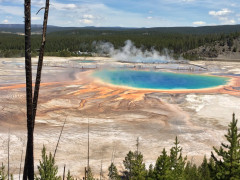Overconsumption is robbery, says Aquinas as he answers the third objection to private property brought from the thinking of St. Ambrose
This is a continuation of my commentary on Thomas Aquinas’s views of private property in Article 2, Question 66 of Summa Theologiæ. ST II-II, 66, 2 [ST 2a2æ 66, 2]. The posts in sequence are: 1) Article 1 Text and Commentary 2) Article 2 Text and Prologue 3) Objection 1 to Private Property 4) On relationship of Natural Law and Human Law 5) Objection 2 to Private Property 6) Objection 3 to Private Property 7) Aquinas’s Views of Private Property 8) The First Human Competence: Care and Commerce 9) The Three Reasons Private Property is Necessary
10) The Second Human Competence 11) Reply to Objection 1: All Things in Common 12) Reply to Objection 2: Analogy of the Theater 12) Reply to Objection 3: Over consumption is robbery (this post)
Reply to Objection 3: When Ambrose says: “Let no man call his own that which is common,” he is speaking of ownership as regards use, wherefore he adds: “He who spends too much is a robber.”
Aquinas now responds to the quote from St. Ambrose in Objection 3, which suggests that private property contradicts the idea that natural law has given everything in common. Aquinas explains that this is not what the saint meant. The saint was referring not to the legitimacy of ownership in general, but to how people use or consume what they own. In other words, people may take private property from the commons. But those who over consume what they have taken are like robbers, since they consume what should be given or prepared for others. Aquinas thus aligns Ambrose with his own view that private property itself is permissible and compatible with the idea that everything was given in common. One cannot take too much as private property from what’s common, but one can consume too much of what one takes.
In our earlier discussion of this objection, we saw that St. Ambrose in On the Clergy appeared to follow the Stoics and hold that private property arose from greed. That position is completely absent here, as Aquinas would have us come to the conclusion that private property is not an act of greed or robbery but arises quite legitimately from human competences. Humans are not being greedy when they claim private property, even if they are rich. As long as they are caring for it and developing what they have appropriated, they are acting by reason and expanding the pie for others. It is only if they consume too much that they act like robbers.
As in his response to the objection of St. Basil, Aquinas aligns Ambrose with his own views. Ambrose is not saying that taking from the commons is wrong or robbery, but only that over consuming what one has taken is inappropriate and against nature. This shifts the discussion from the inappropriate taking of what’s common to the intriguing question of what constitutes consuming too much.
Still, it is interesting to think about how serious Aquinas is in treating over consumption as “robbery.” How can this be robbery if one has already taken what’s common and made it one’s own. Once it is one’s private property, how can one not have a right to consume it? If one is only a steward and holding what was taken in trust for others, then in what sense was it ever private property? This is an intriguing question that Aquinas does not answer and that his position on property leaves open.




